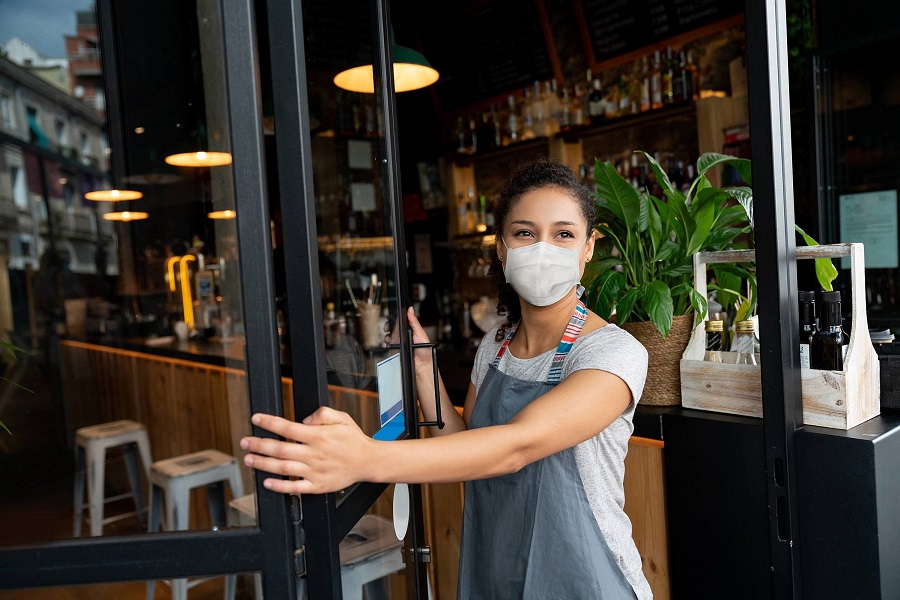RIO DE JANEIRO, BRAZIL – Last year, the bar and restaurant business registered the closure of some 2,500 establishments in the city, but it is now beginning to emerge from this critical situation.
Figures on the generation of formal jobs show that the sector registered a positive variation of 1,784 hires in the month of August in the state. Concurrently, the progress of relaxation seems to be attracting more customers: in a decree announced for today, Mayor Eduardo Paes waives the requirement of a minimum distance of 1 meter between tables.

From May through August, restaurants and the like were the second main activity generating formal jobs in the state (3,630 more) and the third in the capital (1,926). Among Brazilian capitals, Rio leads with the balance of job openings (3,252) in bars and restaurants in the last 12 months, followed by Fortaleza (1,931) and Curitiba (1,433).
The announcements of the opening of new establishments in the city are also welcome news. The list of attractions on the way includes another branch of a thematic bar for those who like samba and the opening in Barra of a famous boteco (bar) in the South Zone.
New units of the well-known Outback chain alone are planned to open in Ilha Plaza Shopping, Madureira Shopping, and ParkJacarepaguá by November.
This week, another Zeca Pagodinho’s Bar will open on Flamengo Beach, a venture of the BFW group. The bar, already present in Barra, will open a third unit in the new ParkJacarepaguá shopping mall, scheduled to be inaugurated in November. The chain’s chef is a heritage of Rio’s boteco cuisine: Antonio Carlos Laffargue, known as Toninho, owner of Bar do Momo in Tijuca.
Toninho recalls that in Momo he used strategies to survive, but now he can breathe easier:
“We are recovering, paying overdue bills. With the release of the use of public space, we have now reached 80% of the revenue we had before. The economy is still unpredictable, but we are confident that the higher number of vaccinated people will help boost business at the end of the year.”
BFW, owner of other brands in Rio, such as Porquinho and D’Heaven, is preparing to expand further. The group currently employs 600 people, but should reach 1,300 by January 2022.
“We believe in science, this way we will return to normality,” says BFW Group deputy director Pedro Henrique Pacheco.
Now with XP’s participation, the holding company of bars and restaurants A.Life-Nino is also heavily investing. The group’s representative in Rio, Flávio Sarahyba, took a branch of Boteco Boa Praça to Arpoador in May (in place of Astor, victim of the pandemic) and tomorrow will inaugurate another branch, now in Barra da Tijuca.
“Going through this crisis with closed bars, suffering losses and maintaining employees was challenging. The trend is that more and more professionalized groups will gain space,” Sarahyba believes.
The situation inspires caution – health-wise and financially. Survival throughout the pandemic took its toll: 58% of restaurants in Rio accumulate debt, according to a survey by the National Restaurant Association (ANR).
“More than half of those that remained open have debts and liabilities that will take from 2 to 3 years to settle,” says SindRio president Fernando Blower. “Nevertheless, we are starting to see light at the end of the tunnel.”
MORE EXCLUSIVE MENUS
In order to tackle the crisis, businesses had to reinvent themselves. Operations became leaner, and many started out with delivery, even if this was not 100% the case. Places with outdoor areas and exclusive menus have gained prominence – after all, leaving home must be worth it.
A month ago, 3 seasoned partners created De Lamare Gastrobar, at Posto 8 in Ipanema, which serves a wide range of appetizers and hearty dishes. Pedro de Lamare (formerly part of the Gula Gula chain), evaluates the sector’s direction: “The increase in vaccination makes people want to go out more, but the sector is still quite rattled.”
Renowned chef Kátia Barbosa, the “mother” of the feijoada (bean stew) dumpling, was forced to close 3 of her restaurants during the pandemic. She managed to reopen Kalango in June, in Botafogo, and, more recently, invested in a new business, Katita, with 2 establishments. She says she has no new plans, because she considers the situation still very uncertain: “We learned a lot with the pandemic.”
New in Rio’s gastronomy, Peruvian QCeviche, at the Mercure Rio Boutique Copacabana, was scheduled to open in 2020, but only did so 2 months ago and is doing well. Today, 28% of its clients are foreigners, and the restaurant is seeking a license to use the sidewalk.
“The hard part is to budget for 2022. The prospect was that 2021 would be the year of resumption, and it wasn’t,” says Gabriella Motta, the hotel and restaurant’s general manager, where some R$20 (US$3.6) million were invested.

